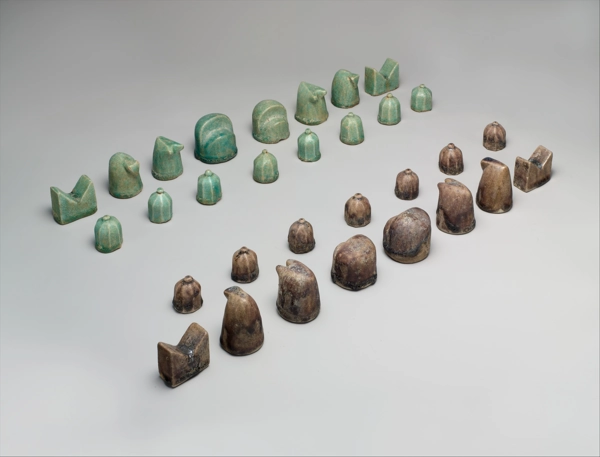Chess etymology adventure
I love etymology. It’s so cool how every word has a little real-life story attached to it. But some don’t, and they make these tantalizing unresolved puzzles with a few pieces missing. Learning etymologies, you get a sense of how lively words are, moving around and occupying different meanings like the shifting borders of a country.
So today, I looked up the meaning of the German word Bauer. I studied some German in college, but I am rusty on it, so I thought it maybe meant “builder”.* It actually means “farmer”, or “peasant”, but I noticed that it’s also the German term for the pawn piece in chess.
Even better, the entry includes a table showing the names for the other chess pieces in German. Even better than that, there’s actually a page with a big table that gives the names for chess pieces in many languages. Just with the clicking around I’ve done so far, I’ve picked up some fascinating tidbits.
Just in the German table, I saw that the term for the bishop was Läufer, which means “runner”, not bishop. I had kind of assumed it would have been called Bischof in German and the equivalent of bishop in most languages, so that was a neat surprise. “Runner” is an approprite name for the piece given its function.
Another great tidbit I picked up from the German table was the word Ross as one of the terms for the knight. Ross means “horse”, evidently, but it’s not the common word I learned in my German class, which would have been Pferd. It’s a more archaic and poetic term for horse, perhaps like steed in English. But it’s cognate with English horse, because both descend from the same Germanic root *hross.
When I was learning German, I noticed that a lot of the cognates between English and German went the other way, where the modern German word was linked to an archaic-sounding English word. For example, Mädchen is the normal word for “girl”, whereas its English cognate maiden is a more archaic word. So it was cool to find Ross–horse, a pair where the English is modern and the German equivalent is archaic.
The bishop wasn’t originally the bishop in English. First it was alfin, from the Arabic word for “elephant”, الفِيل (al-fīl, literally “the elephant”). There are a lot of languages that still call the piece either something based on al-fīl or just their native word for “elephant”. After that, it was archer, which was probably a reference to its movement.
I’m still looking around to figure out how exactly bishop got introduced as the English word for that piece. I always assumed the piece looked the way it did because it was meant to be a bishop’s hat, but if it’s a more recent coinage, perhaps it got that name for the reverse reason: people noticed the elephant piece looked kind of like a bishop’s hat and started calling it that. Please let me know if you know any more about it.

In a lot of languages, the rook is called something like “tower”. But English rook comes from the Persian word رخ (rox), which apparently is just used for the chess piece. Relatively few langauges use a descendant of rox, not even French, which is where English got it, via Old French’s roc.
Okay, I’d better stop myself there. Etymology really is one of those topics I could just talk forever about; this stuff is totally fascinating to me. But if I don’t stop now, we’re quickly heading towards wall-of-text territory.
Do you like etymology?
Do you have other topics you tend to rabbit-hole on?
Do you play chess?
Let me know your thoughts at my Ctrl-C email: gome @ ctrl-c.club.
* I was close; Bau means “building” or “construction”, both the act and the result. The correct word for this kind of builder according to Wiktionary is Bauarbeiter.